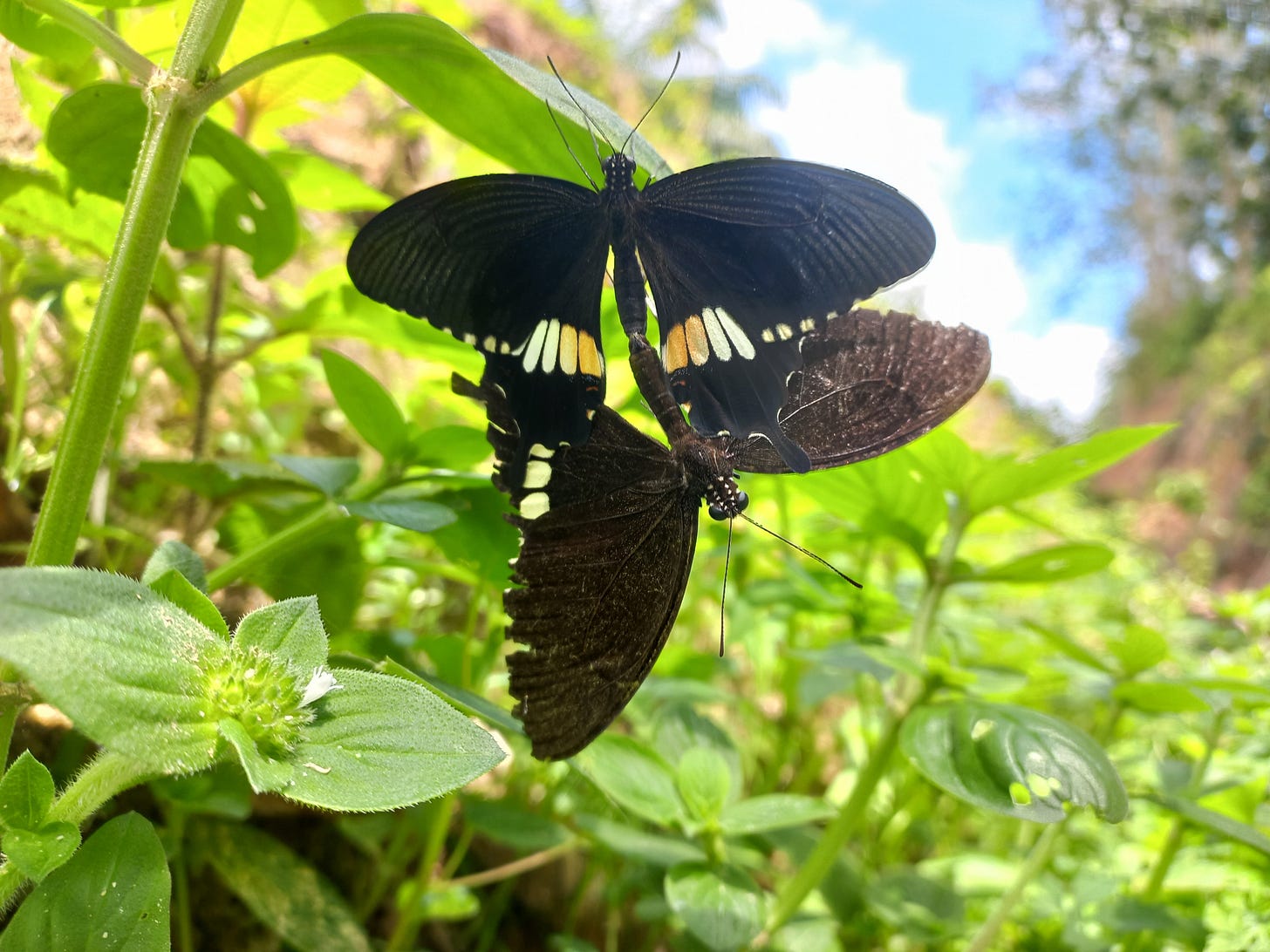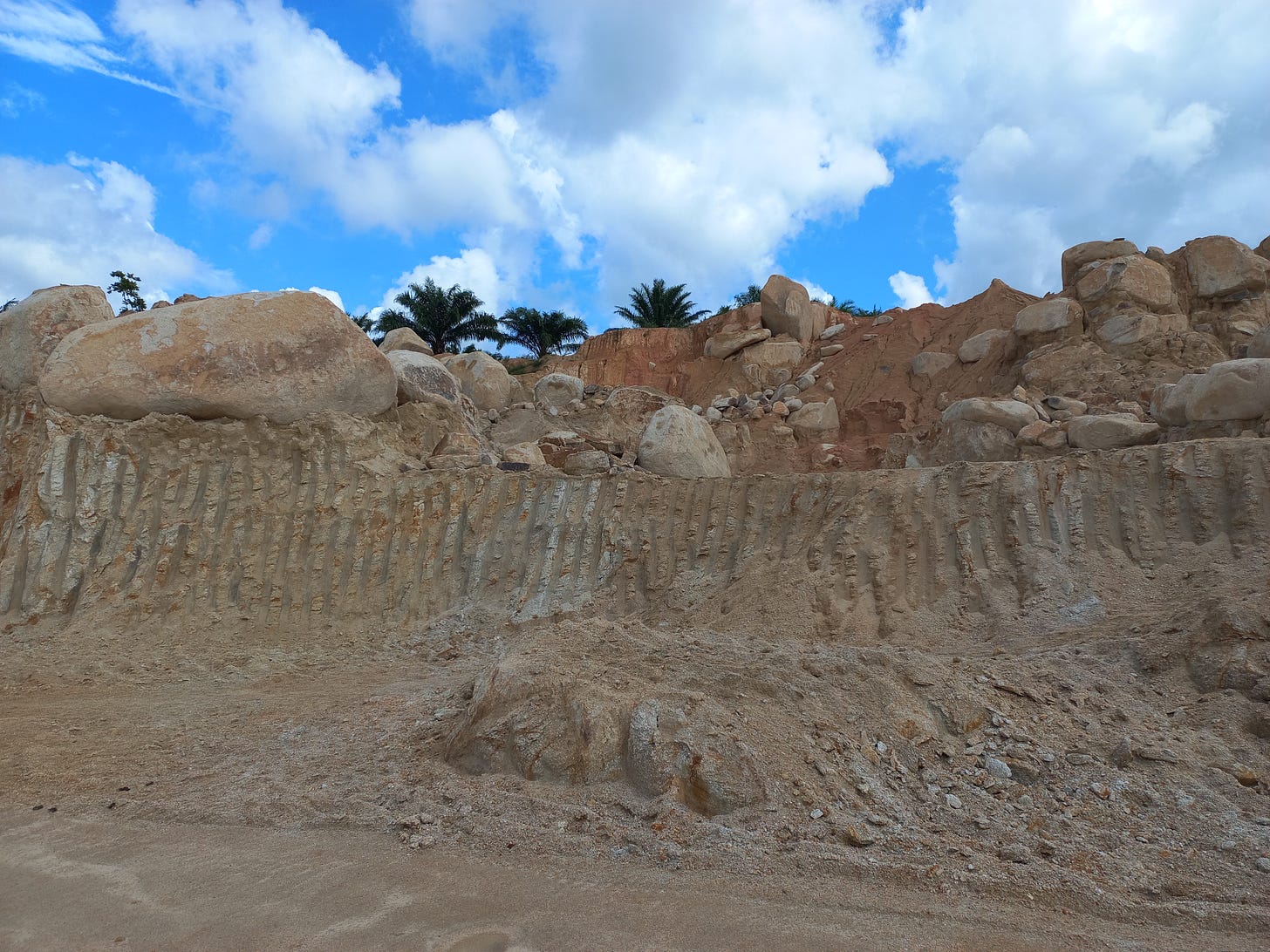The rattle-like song of the frog choir was underlined by a homogeneous buzz of cicadas. The sound effects only became less than perfect when cars and motorcycles whizzing by on the road added to the decibels entering Sindbad’s abode. What purpose has created this small building by the roadside was anyone’s guess. It looked like a conservatory with low walls, windows removed, a metallic roof and a tiled, happily dry floor which has already started to be explored by vines with large leaves. Mysterious, tiny legs walked on the roof. The wet, stuffy air was still holding on to the heat of the day.
Sindbad stretched out comfortably on his bedroll. Travelling soon makes us face our own dogged patterns, he thought. All those habits that are not good for us, yet we keep doing them. Perhaps because we don’t know how to do anything else. Or because they are like tracks left in the ground which we keep slipping into. Or because we don’t even notice them. I, for example, if the world doesn’t match the picture in my head, will just march on, trying to find the image that never was. It doesn’t matter that the river is an hour and a half away, quickly ascending tropical darkness is almost here and everything is completely wet. If the city doesn’t meet my criteria I trudge on to find a camping place by the river.
The nice young man who saw Sindbad walking in the dark and offered to take him to the river with his large backpack, had kept talking, turning back on his motorcycle. This was not the capital where many locals were using English even in their families, but appropriate key words could convey pieces of meaning. Lots of rain, the man had said and something about sliding. Careful!
Sindbad couldn’t agree with him more. Careful! – he had repeated, referring to the motorcycle that had suddenly turned off the road, starting down on a slope opening up between two sheds. The impossibility of descent soon became obvious for the motorist and Sindbad was saved. They parted with a warm handshake. Down by the riverside there was a meter-deep layer of mud. Sindbad laborously climbed back to the road and continued on in his search for a place to spend the night. Luckily he stumbled upon the abandoned house offering protection from night rains and the muddy ground. Later mosquitoes convinced him to erect the tent under the roof. How come things usually work out at the end? – he wondered.
Beside our actions, of course, there are our emotional habits, he continued his former train of thought. These may be even more characteristic than our deeds. They include our general attitude towards the world, how we react to events. When something turns out different than we expected, what do we do? Whine? Get angry? Feel sorry for ourselves? Get depressed? We usually think of these emotions as a consequence of external events. Actually the events only unleash an internal pogram. Worrying, for example, needs hardly any input at all. It’s like a kind of a radar that always finds some target, something you can worry about.
Sindbad was not talking into thin air. He had plenty of experience with this subject. He had an old hobby of imagining things not working out, then anxiously rooting to avoid that situation. It’s better than spectator sports, he thought. You don’t even need to build a stadium. A perfect deal. Just vividly imagine that you are attacked by forty robbers, ripper ufos and bloodthirsty bears in the middle of an earthquake combined with a cunami.
At which point he turned to the reader. Are any of the emotions mentioned familiar? – he asked. Or do you have some other favorite and useful pastime? Obviously, sometimes it’s necessary to get angry and declare that you have boundaries that can’t be breached. I’m not completely sure, however, that the lifestyle-type of fury many of us thrive on in Budapest is as manly and sexy as we believe. Or take complaining, pessimism, any of these emotions. When the everyday ceremonies that fill out your life cease, these patterns hop out onto the floor of the airport and look into your face with a large grin.
The next day provided plenty of opportunities for character development. Our hero, after a lot of complications, finally did arrive to a brown, flooded river, the opposite side of which was occupied by an actual tropical jungle. We’ll see each other here by the boat, he said to the French people with whom he crossed and entered the temple of Nature.
Sindbad was not completely enthusiastic about most features of modern psychology. This opinion was based on plenty of experience from a number of countries as a student, coworker, teacher, patient, dropout. Many psychological schools aim at conscious realization, he shook his head. This is about as useful as having to breathe consciously. Could there still be alcoholics that don’t know that their habit is bad for them?
Being conscious of our weaknesses, he thought, only works in some very concentrated forms of practice, such as certain forms of meditation. Traveling can also be perceived as a kind of meditation in which we sweep our minds clean, creating a situation where our stupid habits, normally swept under the rug, look us into the face again and again. This way we provide an opportunity for ourselves to somehow get fed up by them. Perhaps we simply become bored of falling into the same hole again and again. Or we create situations in which it is easier to choose a different response, and when this repeatedly happens we eventually create a new emotional pathway.
Another possibility, he mused, is that during travelling there is less room for superfluous, energy-consuming things. Hunger, tiredness, uncertainity are enough, there is no capacity left for whining. You have to concentrate on solving situations. If my father hadn’t gotten bored of my whimpering and hadn’t finally tossed me into the middle of the pool I’d probably not be able to swim today.
Sindbad stopped musing and plunged head on into the rainforest where the very act of inhaling air was a profound and fascinating experience. Even the plastic walkway built for tourists has hardly taken away anything from nature’s mad party. There was a variety, a lushness of life unexperienced ever before. A three-dimensional space completely filled with living creatures to the top of the giant trees. The beauty of shapes, their tangled disorder yet complete harmony aroused ancient feelings. How wonderful this planet could be if we simply allowed it to be, he thought. Malaysia seemed to be one single palm plantation set in regular rows, save for these few remnants of forests and the thickly inhabited southern seashore. What could motivate this civilization to change its destructive habits?
Extraterrestrial aesthetics of fluttering jewel-butterflies, deep cleanness of wet air, voices of an invisible multitude of creatures — it was as if he was walking in a story or dream came to life. I read so many books about rain forests, he thought. Yet I don’t remember any of them mentioning this perfumed air. The moisturized essence of a million different kind of plants, a sort of mega Bach flower remedy, a walk in the lungs of Earth.
A childhood dream of Sindbad had been fulfilled. He made it to the tropical rain forest, the richest biotope of the planet. Hopefully you could also take a little bit of a walk in this paradise.








